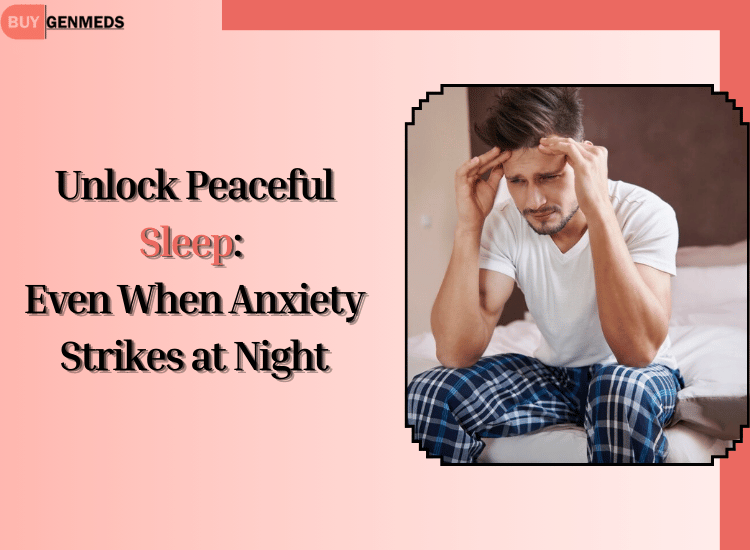Introduction
Have you ever tossed and turned all night because your mind just won’t shut off? If you’re living with anxiety, know that you’re not alone—many people face the same struggles. Sleep and anxiety are closely linked. When you follow healthy sleep habits, you may start to feel calmer, less stressed, and better equipped to manage Distress. On the other hand, poor sleep patterns can make Distress worse, triggering more stress and creating a vicious cycle. In this blog, we’ll explore how anxiety and poor sleep impact your life and what you can do to break the cycle.
Is Anxiety a Mental Illness?
Let’s start with the basics. What exactly is Distress? And is it considered a mental illness?
Anxiety is a natural reaction to stress. Feeling anxious in certain situations—like before a test, job interview, or important event—is completely normal. It helps keep us alert and prepared. But However, if your worry becomes persistent or overwhelming, it could be a sign of an anxiety disorder.
Yes, anxiety disorders are recognized mental health conditions. They’re different from everyday nervousness and can interfere with your ability to live a normal life. Individuals with anxiety disorders frequently steer clear of specific situations to avoid triggering their symptoms.
There are several types of Distress disorders, including:
-
Generalized Anxiety Disorder (GAD)
-
Panic Disorder
-
Agoraphobia
-
Specific Phobias
-
Selective Mutism
-
Separation Distress Disorder
The good news? Anxiety disorders are treatable—often through therapy, lifestyle changes, and sometimes medications. Figuring out what’s causing your anxiety can help you manage it more easily and find the right treatment.
Why Is a Good Night’s Sleep So Important?
Sleep is as vital as eating, hydrating, and breathing. Sleep helps your body and brain recharge, heals your muscles, clears your thoughts, and prepares you for the day ahead. Without proper rest, your physical and mental well-being can decline.
While you sleep, your body cycles through different sleep stages—including the all-important REM (rapid eye movement) stage, where most dreaming happens. Each stage has a specific purpose, and getting enough of all of them is key for deep, restorative rest.
When your sleep is disturbed, it doesn’t just leave you groggy. It can affect your mood, memory, concentration, and even your immune system. Chronic poor sleep increases the risk of serious health problems like:
-
Depression and Distress
-
Weight gain
-
Heart disease and stroke
-
Type 2 diabetes
-
High blood pressure
-
Daytime fatigue and car accidents
Sleep is vital not just for functioning, but for thriving.
How Anxiety Interferes With Sleep
Feeling anxious before big events or during stressful moments is a normal part of life. In those moments, your body releases stress hormones like adrenaline and cortisol to help you respond quickly—this is often called the “fight or flight” response.
But for people with chronic Distress, the body stays in that heightened state even when there’s no real threat. That means you may feel nervous or fearful in everyday situations, like driving, socializing, or even trying to fall Rest.
As bedtime approaches, Distress can keep your mind racing with worries. Even if you manage to fall asleep, you might wake up in the middle of the night with anxious thoughts or disturbing dreams. For some, stress can even cause insomnia or contribute to health problems such as hyperthyroidism, which can further affect sleep.
Studies also show that anxiety affects REM Rest, the stage where most vivid dreaming happens. People with Distress often experience intense, stressful dreams that turn into nightmares, leading to poor Rest quality.
Over time, this creates a loop: Distress disrupts Rest, and lack of Rest worsens Distress.
Medications That Can Help You Sleep
If anxiety is affecting your ability to Rest night after night, it might be time to speak with a healthcare provider. Short-term use of sleep aids can help you reset your sleep pattern and manage Distress.
Some commonly prescribed medications include:
-
Zopisign 10 mg
-
Zopiclone 7.5 mg
-
Nappie 7.5 mg
These medications are generally intended for short-term use and must be taken under the guidance of a healthcare professional. These treatments are most effective when paired with healthy habits and professional therapy.
Lifestyle Changes to Improve Anxiety and Sleep
Small adjustments in your daily routine can make a big difference in managing Distress and improving your Rest quality. Here are some habits worth adopting:
1. Get Moving
Engaging in regular physical exercise can elevate your mood and ease feelings of distress. Exercises like walking, yoga, and tai chi help your body produce endorphins and serotonin—natural chemicals that help you feel good. Even 20–30 minutes a day can help regulate your Rest patterns.
2. Eat a Balanced Diet
What you eat affects how you feel. Choose whole foods, stay hydrated, and avoid sugary snacks or highly processed meals. Cutting back on sugary drinks like soda and fruit punch may help reduce symptoms of anxiety and depression.
3. Reduce Alcohol Intake
While it might seem like alcohol helps you relax, it disrupts your sleep and can worsen Distress over time. Many people use it to numb stress, but it often leads to dependence and other health issues. If you’re coping with anxiety, it’s wise to limit or completely avoid alcohol, as it can worsen symptoms.
Conclusion
If you’re struggling with Distress and finding it hard to get a good night’s Rest, you’re not alone. Medications like Zopiclone and Zopisign 10 mg can offer short-term relief, but they’re not a cure. These treatments are most effective when combined with healthy habits, mental health support, and stress management techniques.
In Australia, Zopiclone is occasionally prescribed to help manage distress-related symptoms that occur alongside epilepsy treatments. But remember: Rest medications should only be used short term and under the guidance of a healthcare professional.
Getting the rest you need starts with understanding your Distress, practicing better sleep hygiene, and reaching out for help when you need it.



